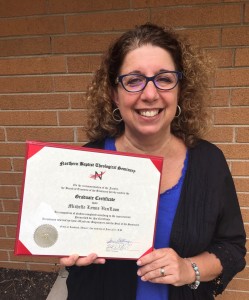I’ve been pondering the words of Deuteronomy 6:4-9, along with Jesus’ words in Matthew 22:36-40 emphasizing that the two greatest commandments are loving God heart, soul, and mind; and loving my neighbor as myself. My husband and I have been part of many different kinds of churches – large, small, formal, informal, focused on preaching, focused on sung and prayed worship, focused on the sacraments. As I reflect on my experience, it has occurred to me more than once since I’ve been a part-time seminary student that the churches we’ve attended have attempted (with varying degrees of success on both their part and mine) to teach me how to love God with my heart, soul and strength. They’ve attempted to strengthen and support me in the vocation of loving my neighbor.
But I’ve never been quite sure how most of these churches have attempted to help their members love God with their minds.
When a church tries too hard to be like a classroom – say, during corporate worship services when the sermon is a 45-minute long lecture that vaguely resembles a research paper because its filled with Greek word studies, quotes from seven different commentaries, and a Spiderman movie reference – it usually loses a measure of its unique identity as a worshipping community. Am I the only one who breaks out in a cold sweat when churches hand out three-hole punched blank sheets in their bulletins so students…I mean the congregation…can take notes and then warehouse these notes in a binder somewhere?
Church-based classes and Bible studies are almost always focused on forming the soul and motivating the heart to obedient living. (Small groups are usually about “doing life together”, which makes it sound like they’re all being held at the maximum security prison at Leavenworth.) It is entirely possible to learn all kinds of new things while listening to sermons or participating in a Bible study. But is collecting a bunch of religious stuff in our frontal lobes the extent of what God intended when he told us to love him with our minds? Does it mean “get smarter”? What if you have an intellectual disability? Does loving God with your mind mean knowledge about the way the world works, wisdom about how to apply that knowledge in concert with God’s Word in your own context – or both?
 I’m still trying to figure out how to best answer those questions. By default, to this point in my life, loving God with my mind has mostly been one long independent study with lots of book reading, augmented with ongoing discussion with my seminary-educated husband. Now that I’m a student at Northern Seminary, I’m learning some new things, but mostly I’m also making all sorts of connections between what I’ve learned on my own through the years. Sometimes I wonder if my head is glowing in class from all the synapses lighting up in my head. It’s not just an endorphin high as my lifelong learning is simultaneously validated and challenged in class. I have moments where I feel the roof open up above me, and I want to hit the floor in awe of how amazing God is. This isn’t just “book learnin'”. One thing I’m discovering about having an engaged mind at this time in life is that my heart, soul, and strength are along for the ride. I am becoming whole, and find deep joy in relating to others as I do.
I’m still trying to figure out how to best answer those questions. By default, to this point in my life, loving God with my mind has mostly been one long independent study with lots of book reading, augmented with ongoing discussion with my seminary-educated husband. Now that I’m a student at Northern Seminary, I’m learning some new things, but mostly I’m also making all sorts of connections between what I’ve learned on my own through the years. Sometimes I wonder if my head is glowing in class from all the synapses lighting up in my head. It’s not just an endorphin high as my lifelong learning is simultaneously validated and challenged in class. I have moments where I feel the roof open up above me, and I want to hit the floor in awe of how amazing God is. This isn’t just “book learnin'”. One thing I’m discovering about having an engaged mind at this time in life is that my heart, soul, and strength are along for the ride. I am becoming whole, and find deep joy in relating to others as I do.
If we in the Church are called to make disciples in the way Jesus did, then we can’t focus on the parts. We certainly should be building habits of personal spiritual discipline that shape our lives and practices in our own journeys with him. But we are a community precisely because we share the call to make disciples. How do we incubate discipleship among this community? Our times of prayer are meant to shape our souls. Our worship aims at our hearts. Our service engages the strength of our bodies. Sermons can instruct and should inspire, but there isn’t much space in a typical church for dialog and reflection. If anything, its a one-directional model. My seminary classroom experiences have surprised me in the way they’ve included dialog (permission is granted to ask questions or share a thought) and reflection (oh, so that’s what those papers are for!). I have learned some profound things from my classmates as well as my instructors.
I don’t want the Church to be a mini-seminary. I have the heart (and maybe soul, mind, and strength) of a teacher in my vocation as a writer. I want others to have their synapses light up via connections that will empower them to love God and others with all that they are. My joy at engaging my mind in community has been instructive. God has met me over the years in the midst of my mostly d-i-y discipleship of the mind because I truly was seeking to learn of his ways and walk in his paths. But being in a classroom has shown me the power of learning to love God with my mind in community.
How has your church helped you learn to love God with your mind? Is there a space in your congregation beyond the sermon to cultivate learning that lights up the synapses and seeks to integrate mind into heart, soul, and strength?















